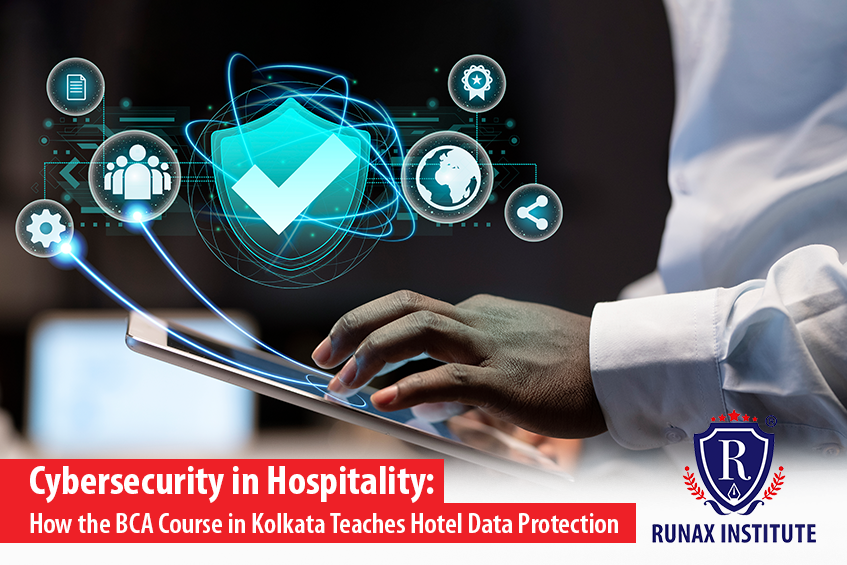Introduction
Think about this: you’re checking into a luxury hotel in Kolkata, excited for that weekend escape, and the front desk staff asks for your ID, credit card, and contact number. Harmless, right? But behind the scenes, all that information is now sitting in a Property Management System (PMS)—a juicy buffet for hackers if not properly secured. And here’s the kicker: many hotels don’t even realise how vulnerable they are until a cyber breach happens and guests start seeing fraudulent charges on their cards or their personal details floating around on the dark web.
Now imagine you’re a student enrolled in a BCA course in Kolkata. Instead of only memorising dry programming theories, you’re diving into cybersecurity modules designed specifically for hospitality IT security. You’re learning how to lock down hotel PMS systems, secure Wi-Fi networks, and implement tokenisation payment security. Basically, you’re training to become the unsung hero who ensures guests can sip their mojitos in peace, without worrying that their card details are being siphoned off by cybercriminals.
This article is your complete guide to understanding why hotel data protection in the BCA syllabus matters in India’s hospitality industry and how BCA colleges in Kolkata are stepping up to train students in hospitality-specific cybersecurity. Stick around, and you’ll see how this career path not only makes you tech-savvy but also places you at the frontline of defending guest privacy in a digital-first hospitality world.
The Rising Cyber Threat to Hotel Data in India
India’s hospitality industry is booming, with global hotel chains, boutique stays, and budget hotels expanding rapidly in cities like Kolkata. But with growth comes risk. Hotels now rely heavily on digital booking engines, PMS software, and online payment gateways, and cybercriminals have taken notice.
Recent years have shown a spike in cyberattacks targeting guest profiles, booking records, and financial transactions. Hackers love hotels because they’re a one-stop shop of sensitive data: addresses, passport numbers, payment details, and even travel patterns. In fact, one anonymised case study from a mid-sized Kolkata hotel showed attackers breaching their outdated PMS, exposing over 10,000 guest records. The reputational and financial loss was devastating.
This is where BCA hospitality cybersecurity training becomes critical. Instead of producing graduates who only know generic coding, BCA colleges in Kolkata are increasingly integrating hotel cybersecurity modules into their programs. Students get exposure to data protection in hotel management, learning to secure Wi-Fi intrusions, PMS vulnerabilities, and IoT-enabled hotel devices.
A fresh graduate trained in these areas can immediately add value by helping hotels comply with standards like PCI DSS compliance in BCA hospitality programs and safeguarding trust in the digital hospitality ecosystem.
Understanding the Indian Cyber-Legal Landscape
Hotels don’t just need technical solutions; they need legal compliance too. India has sharpened its cybersecurity and data protection laws to handle the increasing frequency of breaches.
India’s data protection system is now based on the Digital Personal Data Protection (DPDP) Act, 2023. Compliance is mandatory as of 2025, as the Ministry of Electronics and Information Technology (MeitY) is actively implementing draft regulations under this Act. Hotels that mishandle guest data or fail to secure it could face penalties, not to mention a total collapse of guest trust.
On top of that, CERT-In (Indian Computer Emergency Response Team) BCA training for hospitality mandates organisations, including hotels, to report cybersecurity incidents within six hours of detection. That’s a tight deadline—so professionals in hospitality IT need to know how to act fast.
Here’s where cyber-law training in BCA programs steps in. Students in a BCA course syllabus on cybersecurity in hotels are taught to align their technical work with legal mandates. They learn not only ethical hacking in BCA hospitality labs but also the legal duty of reporting incidents. This combination ensures that graduates aren’t just coders but also compliance-ready professionals who understand the DPDP Act compliance in BCA courses.
Hospitality-Specific Threats: PMS, Wi-Fi, and IoT Vulnerabilities
Hotels are practically playgrounds for cybercriminals. Think about it: one outdated PMS, one insecure Wi-Fi router, or one poorly configured smart lock, and bam—the entire system is compromised.
Take PMS, for example. Many hotels in India still run outdated versions that don’t have encryption or proper access control. That means guest records are often sitting ducks. Similarly, hotel Wi-Fi—especially free guest Wi-Fi—is notorious for being unsegmented, making it easy for attackers to eavesdrop.
Then comes IoT. Hotels love smart gadgets like RFID locks, IoT-enabled lighting, and connected TVs, but these devices are often riddled with vulnerabilities. Remember the Saflok RFID flaw that allowed attackers to clone hotel keys? That’s the kind of nightmare scenario BCA students need to study.
That’s why hospitality IT security BCA programs now include IoT hotel security in the BCA curriculum and BCA PMS security training. Students simulate attacks on PMS systems, configure secure Wi-Fi using WPA3 enterprise protocols, and learn how to patch IoT device flaws before hackers can exploit them.
Curricular Integration: Labs, Simulations, and Real-Life Case Studies
Let’s be honest—no student remembers much from theory-heavy lectures. What actually sticks is hands-on practice, especially when it involves real-life case studies and breach simulations.
That’s why leading BCA colleges in Kolkata are integrating cybersecurity labs, ethical hacking workshops, and incident response simulations into their BCA curriculum for hotel cybersecurity. Students might face a data breach simulation in BCA coursework, where they practice identifying a PMS breach, isolating infected systems, and restoring guest trust with professional communication.
Case studies also play a huge role. For example, anonymised examples of OYO or Marriott breaches are recalibrated for Indian hotels, helping students understand how global issues apply locally. These simulated ransomware attacks on PMS systems teach them how to triage, recover, and report incidents under Indian law.
This kind of experiential learning ensures that by graduation, students aren’t just theory experts but actual problem-solvers who know how to secure a hotel under pressure.
Payment Security: PCI DSS and RBI Tokenisation Norms
If there’s one thing hotels absolutely cannot afford to compromise, it’s payment security. Every swipe, tap, or online booking runs through systems that, if breached, can cause instant chaos.
The global standard here is PCI DSS v4.0, which becomes fully enforceable by March 31, 2025. Hotels must comply with requirements like encryption, restricted access, and multi-factor authentication for all payment data. Meanwhile, in India, the Reserve Bank of India (RBI) mandates tokenisation of card transactions, replacing card numbers with unique tokens to minimise fraud.
For this reason, PCI DSS compliance and RBI tokenisation security training are prioritised in BCA hotel cybersecurity courses. Students learn how to design payment gateways that meet compliance standards, secure storage systems for card data, and integrate token-based security to protect transactions.
Graduates from BCA colleges in Kolkata walk out understanding not just how to code a payment app but also how to securely handle sensitive financial information in real-world hospitality settings.
Incident Response and Reporting Protocols
So, what happens if a breach still occurs despite all preventive measures? That’s where incident response training in BCA hospitality courses becomes indispensable.
Students are trained to follow structured workflows:
- Identify the breach quickly.
- Isolate and triage affected systems.
- Report to CERT-In within the six-hour window.
- Communicate with stakeholders, regulators, and guests.
- Recover operations while preserving digital evidence for investigation.
This isn’t just about technical patching. It’s also about managing reputation. One misstep in guest communication can cost a hotel more than the breach itself. That’s why guest privacy training in BCA courses emphasises how to reassure guests, maintain transparency, and comply with both DPDP and RBI guidelines during crisis communication.
By practising incident response in BCA hospitality modules, students leave with the confidence to handle breaches under both pressure and legal scrutiny.
Changing Trends: AI Defences, Data Minimisation, and Guest Privacy
Hospitality cybersecurity is not static—it evolves as quickly as technology itself. Guests today expect their personal data to be handled with utmost confidentiality, and regulators are ensuring that happens.
That’s why data minimisation and privacy by design are becoming must-haves in hotel IT systems. Instead of collecting unnecessary details, hotels now focus on only what’s essential and securing it with encryption.
The next big shift? AI-based hotel cybersecurity. BCA students are being introduced to AI-driven anomaly detection tools that identify unusual login attempts, flag suspicious network traffic, and even predict ransomware patterns. Imagine an AI assistant inside the PMS that alerts staff about a compromised guest account before it’s too late.
This is the future that BCA cybersecurity modules in Kolkata are preparing students for: a combination of AI defences, privacy dashboards, and adaptive authentication that keeps hotels ahead of cybercriminals.
In a Nutshell
Cybersecurity in hospitality isn’t just a “nice-to-have” anymore—it’s the backbone of guest trust and business survival. Without skilled defenders, the risk is quite high because hotels in Kolkata and around India are soft targets for hackers.
The good news? BCA courses in Kolkata are stepping up, weaving hospitality cybersecurity modules, real-world breach simulations, PCI DSS compliance training, and DPDP Act compliance sessions directly into their syllabus. By doing so, they’re creating a new generation of IT professionals who not only understand data protection in hotel management but also know how to act under pressure, secure payments, protect guest privacy, and future-proof hotel systems with AI cybersecurity.
For students, this isn’t just about landing a tech job—it’s about becoming a frontline defender of India’s growing hospitality industry. And for hotels, hiring such graduates means they can finally let guests relax, knowing their personal and payment data are safe.
Frequently Asked Questions
1. Why does the hospitality sector need cybersecurity so badly?
Because hotels store sensitive guest information like IDs, card details, and travel data, they are the prime cybercrime targets.
2. What makes the BCA Course in Kolkata unique for hotel cybersecurity training?
Colleges are tailoring their syllabus with modules on PMS security, IoT threats, PCI DSS compliance, and incident response.
3. Does the BCA syllabus cover Indian cyber laws like the DPDP Act?
Yes, students learn legal compliance, reporting requirements under CERT-In, and data protection mandates under the DPDP Act.
4. How do BCA students practice real-world breach scenarios?
They participate in simulations, ethical hacking labs, and mock ransomware attacks on hotel PMS systems.
5. What future trends in hotel cybersecurity are included in BCA programs?
AI anomaly detection, adaptive authentication, encrypted dashboards, and privacy by design principles are being introduced.






